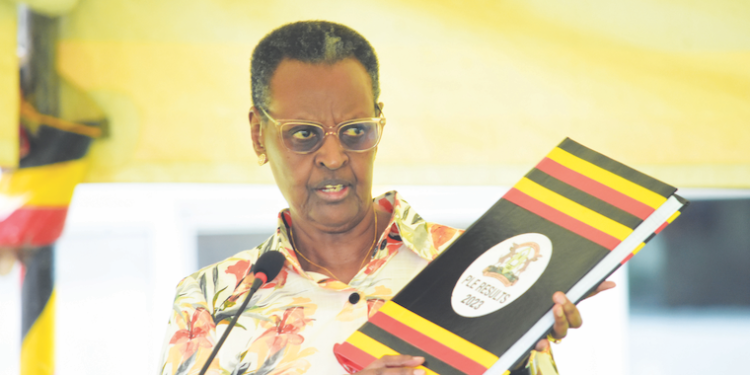By THE OBSERVER UG
Examination malpractice remains a significant concern for the Uganda National Examinations Board (UNEB), with teachers frequently identified as the primary culprits.
This issue is further exacerbated by school proprietors engaging in bribery and affluent parents determined to see their children succeed at any cost. The problem is particularly severe at the Primary Leaving Examinations (PLE) level. During the 2023 PLE results announcement at State House, Nakasero, UNEB’s new chairperson, Prof Celestino Obua, highlighted the prevalent forms of malpractice witnessed last year.
He noted, “The major forms of malpractice last year involved teachers found inside examination rooms writing answers for candidates to copy.”
In some instances, teachers were caught writing Mathematics calculations and answers on chalkboards during the examination. Others resorted to writing answers on small chits, which were discreetly passed to candidates through windows.
Prof Obua emphasized the legal consequences of such actions, stating, “All these culprits have been produced in court and charged under the relevant sections of the UNEB Act, 2021 that provides for stringent penalties.”
He also expressed hope for the swift issuance of regulations to support the Act, which UNEB and the ministry have recently completed. The board successfully curtailed the practice of opening question paper envelopes and distributing their contents via social media, a method of cheating that had become widespread.
Currently, 21 cases of exam malpractice are being processed in various courts across the country. Prof Obua pointed out the challenges faced by UNEB in pursuing these cases, including the transportation of witnesses and frequent adjournments, which impose additional burdens on the board’s budget.
To address these challenges and expedite the legal process, Prof Obua proposed the establishment of a special utility court. He believes that such a court would concentrate all cases in one place and ensure their faster conclusion.
“For the UNEB Act to have an impact and serve the purpose of deterrence, the cases need to be dealt with expeditiously,” he explained. The special court, according to him, could resolve many of the issues UNEB currently faces in handling these cases.
In the past, UNEB made it a practice to publicly announce the names of schools and the number of withheld results of their candidates pending investigations by the examinations security committee. However, this system has been gradually phased out, with the board now opting to release lists of districts and schools with canceled results. These lists, typically published after all levels of results are released, are also somewhat restricted.
PLE GENERAL PERFORMANCE
UNEB released the general performance data for the 2023 Primary Leaving Examinations (PLE) last week. A total of 749,254 candidates from 15,859 centers registered for the exams, a decrease of 83,400 (10.0%) from 832,654 candidates in 2022. Of these, 357,755 (47.7%) were boys, and 391,499 (52.25%) were girls, continuing a seven-year trend of increasing gender disparity in candidature.
The 2023 exams saw the absenteeism rate drop to 1.6%, the lowest in five years, with 12,323 candidates not sitting for the exams. Dan N. Odongo, the UNEB executive director, observed that a higher proportion of candidates passed in Division three and above, though there was a slight decline in the number of candidates who passed in Divisions one and two compared to the previous year.
“Overall, the performance of 2023 candidates is comparable to that of 2022,” Odongo stated.
However, he expressed concern over the high number of candidates in Division U, which stood at 88,256. Although there was a decrease from 12.0% in 2022 to 10.4% in 2023, he emphasized the need to address this issue to prevent an increase in school dropout rates.
UNEB also highlighted the performance in specific districts. Districts such as Kibuku, Madi Okollo, Dokolo, Kween, and Namisindwa reported percentages well above the national average, with several districts having over 20% of their candidates in Division U.
Notably, in Kaabong, Karenga, and Nabilatuk, no female candidate passed in Division One. Odongo urged an investigation into the causes of low performance in these areas.
“It is necessary to find out the causes of the low performance and address them,” he said.
He also mentioned that UNEB examiners have compiled a report on the candidates’ work to advise teachers on addressing areas of weakness, urging teachers to utilize this report.
In terms of subject performance, there was a slight improvement in English, Integrated Science, and Mathematics, with pass rates at eight and above. However, there was a decrease in performance in Social Studies. Females outperformed males in English, but males performed better in the other three subjects, also recording a lower failure rate overall.
UNGRADED CANDIDATES TO REPEAT
The First Lady and minister of Education, Janet Museveni, recently addressed the issue of candidates who did not pass their examinations, advising them to repeat primary seven in public schools. This advice comes in light of the fact that any candidate who falls into Division U (Ungraded) is not eligible for admission to senior one.
The selection exercise for those who are eligible is scheduled for February 1 and 2, 2024, with successful students expected to start on February 19.
Janet Museveni has directed the permanent secretary of the Education Ministry to ensure that ungraded candidates are allowed to study at the government’s expense. She emphasized the importance of teachers and parents working closely with these children to improve their grades, making them eligible for further educational opportunities beyond primary seven.
In her statement, the First Lady reflected on the automatic promotion policy initiated by the government in 2007. This policy, part of the Universal Primary Education (UPE) and Universal Secondary Education (USE) programs, allows learners to progress from one class to another regardless of their performance quality. Despite consistent criticism from educationists, including head teachers and teachers, this policy has been continuously implemented in public schools.
However, given the failure rates in the 2023 results, Museveni announced that her ministry plans to undertake a comprehensive review of the automatic promotion policy.
“It is a disservice to move a learner to the next level when you as a teacher or head teacher, you very well know that the child has not demonstrated minimum mastery of the appropriate knowledge and skills in the previous class,” she stated.
Promoting a learner merely because the academic year has ended, she argued, is a disservice to the child, the education system, and the country.
Regarding examination malpractice, Janet Museveni called upon the police and the judiciary to take action against those involved in such activities. She expressed concern that assisting learners to cheat in examinations undermines the confidence and credibility of the entire education system and compromises the country’s integrity.
“When such learners who cheat go through unmasked, it communicates a bad image to their peers and models a terrible trend,” Museveni commented, highlighting the broader implications of exam malpractice on the education system and the country’s image.







Discussion about this post